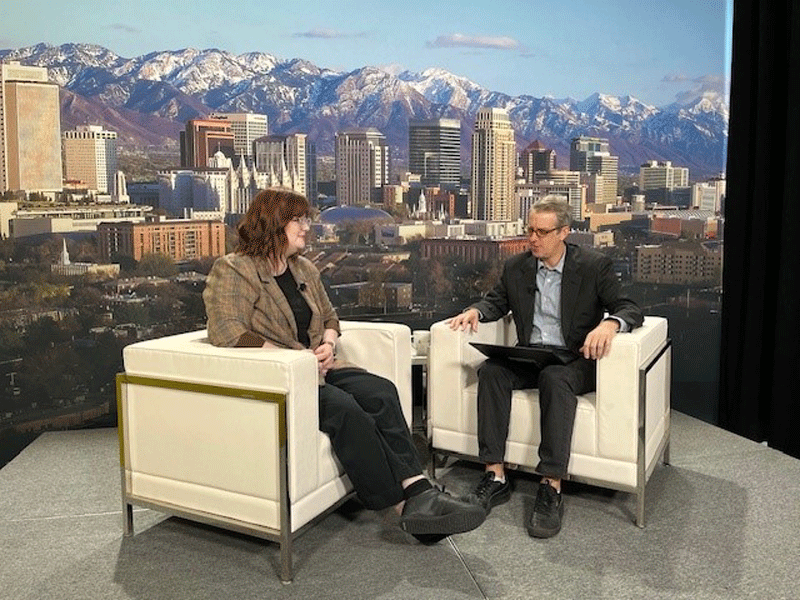
Kate Trigger Duffert and Fred Tangeman in the studio at the Salt Palace Convention Center prepare to go live on GA Daily Sunday afternoon. Photo by Randy Hobson.

Kate Trigger Duffert and Fred Tangeman in the studio at the Salt Palace Convention Center prepare to go live on GA Daily Sunday afternoon. Photo by Randy Hobson.
Kate Trigger Duffert, the director of General Assembly Planning, started coming to the assembly as a girl. This time her son, who’s 6, is accompanying his mother. That’s about the age Trigger Duffert started attending GA under the watchful eye of her own mother.
“I remember being overwhelmed by how big the church was,” she said of her earliest GA experience during Sunday’s edition of GA Daily, which is hosted each day by Fred Tangeman and can be viewed here. “As I got older, conversations felt so important and so weighty. They really expanded my own perspective beyond my own congregation and community.”
“My son is having some of those same moments now,” she said. “He’s saying, ‘Wow, this is really big’ and ‘Wow, this is really cool.’ He is fascinated by the fact that people are coming together and it’s important to them. He is a little upset that the ballroom [where plenaries start Sunday afternoon] is not a giant room full of balls.”
“He’s not the only one,” Tangeman said with deft comedic timing.
Trigger Duffert told Tangeman she was eager to hear feedback on Sunday from commissioners and advisory delegates who worshiped at churches in the Presbytery of Utah, and later broke bread there with church members and friends. “I hope to hear how worship impacted them,” Trigger Duffert said, “and how the churches were impacted by the rush of visitors.”
Saturday was a day of technical rehearsals leading into Sunday’s plenary session, which culminates in the election of co-moderators Sunday night. “We hope all that preparation will mean we’re ready,” but there will be invariable glitches, she predicted. “We have an outstanding team backstage to pivot and make new choices when we have to. I hope people watching won’t necessarily see all the things that make it happen.”

Kate Trigger Duffert shares her experiences planning the 226th General Assembly. Photo by Rick Jones.

Kate Trigger Duffert shares her experiences planning the 226th General Assembly. Photo by Rick Jones.
Once plenary sessions commence, the focus is “on making sure people are where they need to be,” especially since many participants — committee leaders, for example — haven’t spent much time on the General Assembly platform, Trigger Duffert said. The stage manager and assistant stage manager “have incredible personal skills, and a lot of folks are on deck if we need to find people. If we need to vamp and fill some time, script writers make sure we aren’t leaving folks hanging while we wrangle people.”
“Being a human is tricky sometimes,” Tangeman noted.
While the paddles — colorful papers attached to badminton racquets — are a thing of the past, much of what goes on during plenary sessions will be familiar to people who witnessed or participated in committee sessions, she said. People will seek recognition through MyGA, and will be able to see how many are in the queue waiting to speak.
“There is plenty of room for observers [in the plenary space] and an overflow room,” so people can talk while the assembly is happening if they want to, she said. “Otherwise, it will feel a lot like a homecoming. The advances in technology do not take away from what this plenary experience will be.”
It’s not like MyGA runs itself, she noted.
“People edit a motion and make sure it is ready to view. That’s a manual process,” she said. “The system does collect the votes, but documenting what happens — that’s people. People are literally behind the curtain manually going through the process together. It’s amazing to watch groups of people as the business moves through them. It’s phenomenal how quickly and carefully they move.”
“That part is so fascinating to watch. Unfortunately, people don’t see it, but now they know we’re back there.”
Ken Tolley, Manager of GA Business and Per Capita, pulled the curtain back a bit more during the broadcast. “It’s been really inspiring to see this is holy work, inviting people’s discernment in this church we love and serve faithfully,” Tolley said.
GA Daily airs at noon Mountain Time each day of the assembly. Watch previous editions here. Columbia Theological Seminary sponsored Sunday’s edition.
